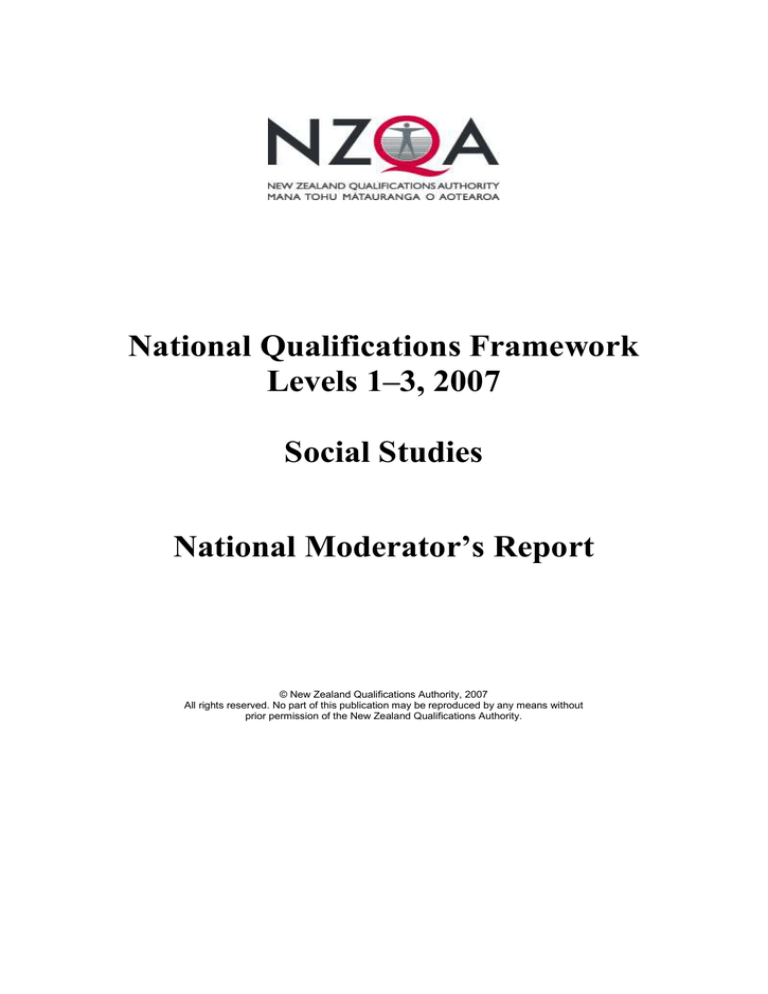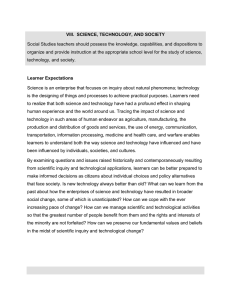
National Qualifications Framework
Levels 1–3, 2007
Social Studies
National Moderator’s Report
© New Zealand Qualifications Authority, 2007
All rights reserved. No part of this publication may be reproduced by any means without
prior permission of the New Zealand Qualifications Authority.
National Qualifications Framework Levels 1 – 3 (Social Studies) 2007
2
General Guidance for Assessors of Achievement and Unit Standards
The purpose of external moderation is to provide reassurance that assessor judgments are
at the national standard and are made on the basis of assessment materials that are fair
and valid.
All assessment materials are expected to:
•
give the learner the opportunity to meet the requirements of the standard
•
have an assessment schedule that gives evidence of appropriate learner responses
and clear judgments at all levels.
The Ministry of Education contracted subject experts to write assessment resources for
achievement standards. These are not pre-moderated. The intention is that they are
modified to suit teaching programmes and learner needs. They do not provide “rules” but
suggest different ways of assessing to the nationally registered standard.
Specific Comments on Individual Achievement Standards
External moderation has established that an increasing number of assessors are
developing quality assessments that encourage comprehensive responses from learners.
These assessments are clearly related to the relevant levels of the achievement standards
and the Social Studies in the New Zealand Curriculum (SSINZ) document. They also
provide contexts that allow learners to demonstrate their conceptual understanding and
their ability to use perspectives as a tool through which to view the societal issues that are
presented to them. The establishment of these linkages are crucial to the success of
learners being able to demonstrate an understanding of social studies through the
development of conceptual understandings.
Guidenotes on perspectives and concepts have been written to assist assessors and should
be referred to when constructing assessment activities: These guidenotes can be found on
the following TKI website:
http://www.tki.org.nz/r/ncea/socstud-conceptguidenotes_28feb07.doc
http://www.tki.org.nz/r/ncea/socstud-perspectiveguidenotes_28feb07.doc
90217: Conduct a social studies inquiry
This standard focuses on the skills required to develop, with direction, a framework for a
social studies inquiry, the communication of relevant information, the drawing of
conclusions based on the information and an evaluation of the process.
Moderation of assessment activities for this achievement standard has shown that many
assessors are using level 6 achievement objectives as the basis for the focus of the Social
Studies inquiries. These inquiries are adding to the learners understanding of social
studies concepts and contextual knowledge as well as providing learners with the
opportunity to direct their own learning within a guiding framework.
It is evident that through the application of the concepts and perspectives guidenote
resources that a deeper understanding of the requirements of the standard has developed.
National Qualifications Framework Levels 1 – 3 (Social Studies) 2007
3
Learners are able to demonstrate conceptual understanding directly as an outcome of a
carefully framed focus for the inquiry (which includes a Social Studies concept) and well
constructed research questions.
This positive trend is paralleled with a tendency for some assessors to use the inquiry as a
process which is devoid of a link to level 6 SSINZ achievement objectives. The focus of
the inquiry should come from the level 6 SSINZ achievement objectives through the
development of a significant idea about society. Without having an understanding of
what the focus is and where it comes from, the learners will have worked through the
inquiry process but their conclusions will most likely not relate to the level 6 SSINZ
achievement objectives. Hence learners are clearly not conducting an inquiry about a
social studies focus, nor are meeting the requirements of the achievement standard.
90218: Examine differing values positions
This achievement standard focuses on the development of why people hold differing
values positions, and the consequences of these differing values positions.
The exploration of stand alone issues that produce values positions have tended to
provide learner evidence of understanding at a lower level compared to those activities
that are based on a context that is linked into a sequence of learning.
All Social Studies learning concepts are integral to the building of understanding. The
values achievement standards at each level are no exception to this.
Progress has been made in terms of assessors integrating conceptual understanding into
the assessment activities. Learners are unable to achieve at excellence without this
conceptual understanding.
Note also needs to be made that there is no quantitative statement(s) in this achievement
standard.
90219: Decide on social action(s) in relation to a social issue
This standard focuses on the development of a variety of social actions that could be
undertaken in relation to a social issue, the likely consequences of each action and the
identification of preferred actions.
The assessment activities written for this achievement standard tend to require learners to
use the same or similar evidence to meet each of the achievement criteria. Given the
current structure of the standard this tendency has been accepted as sufficient evidence.
However, assessment activities that promote separate thinking about each of the criteria
have tended to avoid some unfortunate repetition to a greater degree.
At the excellence level the standard requires reasoned argument, not just a list of reasons.
This involves the construction of an argument that contains specific evidence within a
logical sequence of argument which supports the selection of the social action.
National Qualifications Framework Levels 1 – 3 (Social Studies) 2007
4
90273: Conduct an advanced social studies inquiry
A variety of high interest inquiry topics have been provided for moderation which are
supported by an increasing variety of primary evidence gathering material and emphasis
on New Zealand focused topics.
The focus of the inquiry should come from the level 7 SSINZ achievement objectives
through the development of a significant idea about society. Without having an
understanding of what the focus is and where it comes from, learners will have worked
through the inquiry process but their conclusions will most likely not relate to the level 7
SSINZ achievement objectives. Hence learners clearly not conducting an inquiry about a
social studies focus, are not meeting the requirements of the achievement standard.
This inquiry requires addressing all three criteria. While learners tend to emphasise the
mechanics involved in identifying a focus, and the gathering, processing and presenting
evidence to support their conclusions, attention must also be given to the evaluation of
the inquiry. Explanatory Note 7 specifies the requirements of “in depth” as necessitating
the evaluation of all aspects of the inquiry, linking the evaluations to consider the inquiry
overall, and makes recommendations for improvements and/or further investigations.
90274: Describe responses to values position(s)
This achievement standard requires the examination of ways people can respond to
values position(s) and analysis of possible reasons people choose particular responses to
values position(s).
Most assessment activities and schedules have required the learner to identify values but
have failed to recognise that the achievement standard also requires the student to provide
an analysis of possible reasons why people choose particular responses. The analysis of
the reasons for the choice or particular responses necessitates the use of social studies
perspectives.
When assessors are designing assessment activities care must be taken to focus on the
development of conceptual understanding and ideas, from the relevant level of
achievement objectives in the SSINZC.
90275: Plan social action in relation to a social issue
This achievement standard focuses on the development of a plan of social action in
relation to a social issue, and analysis of social action and its likely consequences.
Evidence from moderation shows that assessors generally need to modify assessment
activities to ensure learners are provided with the opportunity to meet the requirement for
achievement with excellence. Refer to Explanatory Note 5.
90691: Conduct an advanced social studies inquiry independently
This standard involves the development and use of a framework to conduct an
independent Social Studies inquiry focused on a significant idea about society. There are
three criteria that need to be addressed in this standard. The process (criterion one) is the
means through which the valid conclusions which are relevant to the inquiry focus, are
National Qualifications Framework Levels 1 – 3 (Social Studies) 2007
5
drawn (criterion two) and the evaluation of the inquiry (criterion three) is a reflection
tool.
Learners must clearly demonstrate that the inquiry process is complete as set out in
Explanatory Note 6, and that the conclusions are relevant to the inquiry focus that is
embedded within the process. Moderation has identified that the focus of the inquiry is
frequently lost within the process resulting in the conclusions being unrelated to the
stated focus of the inquiry.
90692: Explain a values system
The standard involves analysing relationships between aspects of a values system and
explaining the significance of these related aspects for society
Assessment activities that have been submitted for moderation and have provided clear
scaffolding for learner achievement have fallen into two groups. Those that attempt to
explain a large values system, eg Christianity, and those that attempt to explain a smaller
values system within a large values system, eg the Cast system in India. In some
instances activities have provided evidence of extensive prior teaching linked with the
development of a two part flow diagram. The first part helps learners to construct their
understanding of linkages between values positions within a values system and the
second links to the significance of these relationships for society. Successful activities
have focused on societal practices that generate relationships between them such as
marriage and the place of women in society.
It is intended to provide guidenotes for users in 2008 to clarify the values based
achievement standards
90693: Examine social action(s) in relation to a social issue
This standard involves analysing social actions in relation to a social issue, examining the
consequences and evaluating the effectiveness of the action.
Assessors generally are tending to develop activities that are focused on more New
Zealand based social actions based on contemporary issues. This trend is bringing more
relevancy to the learners and is reflected in greater depth of learner responses.
There is evidence that learners are struggling with the specific structures that are required
at this level when using perspectives. Detailed prior teaching and experience of the use of
perspectives needs to take place prior to the assessment to scaffold learner understanding
of how to incorporate perspectives into their responses.

